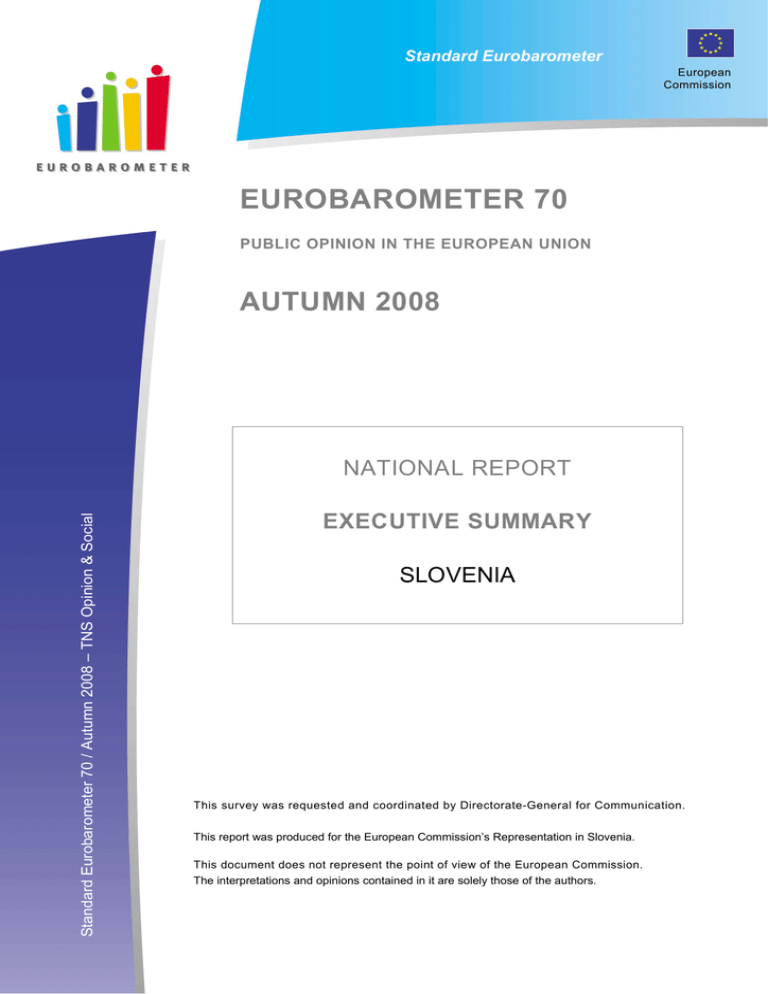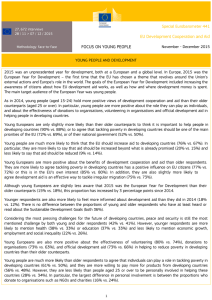EUROBAROMETER 70
Anuncio

Standard Eurobarometer European Commission EUROBAROMETER 70 PUBLIC OPINION IN THE EUROPEAN UNION AUTUMN 2008 Standard Eurobarometer 70 / Autumn 2008 – TNS Opinion & Social NATIONAL REPORT EXECUTIVE SUMMARY SLOVENIA This survey was requested and coordinated by Directorate-General for Communication. This report was produced for the European Commission’s Representation in Slovenia. This document does not represent the point of view of the European Commission. The interpretations and opinions contained in it are solely those of the authors. 1 EXECUTIVE SUMMARY I. LIFE IN SLOVENIA (EU AND WORLD) Slovenians remain satisfied with the life they lead. They rate the Slovenian economy as better than they rate the European and world economy. Slovenians are more critical about the employment situation and the increasing living costs. 85% of the surveyed Slovenians are satisfied with their life, which is 4 percentage points lower than 6 months ago. Slovenia is listed above the European average (76%), and, together with Cyprus, shares the first place among the new member states (EU27) regarding life satisfaction. 52% of Slovenians rate the current economic situation in Slovenia as good, which is 6 percentage points lower than a year ago. Only 29% of the citizens of the EU Member States have a good opinion of the economy in their country; since the last survey the rating "good" decreased by 19 percentage points in the EU27. Half of the surveyed Slovenians rate the economic situation in Europe as good (55%). This rating has decreased by 21 percentage points since last year. On average, 33% of European citizens rate the economic situation in Europe as good – this rating decreased by 25 percentage points since the last survey. The ratings of the world economy at this moment are even worse. 61% of Slovenians and 71% of EU citizens, on average, rate the world economic situation as bad. On a personal level, Slovenians hold less pessimistic view of the situation: 62% consider their household financial situation as good; 63% consider their personal employment situation as good. The lowest rated is the current situation regarding living costs, which has been rated as bad by 84% of the surveyed Slovenians. More than half of the surveyed (55%) stated that they have trouble paying their bills at the end of the month. Even though the share of Slovenians who rate the employment situation in Slovenia as good increased by 3 percentage points in the last six months, the majority of respondents has a critical opinion of the situation. 62% of those surveyed rated the situation as bad, while 35% consider it as good. Two priority tasks for Slovenia are the fight against inflation and the improvement of the economic situation. There is pessimism about future prospects: in the next 12 months, the majority of Slovenians expect an aggravation of the economic situation in Slovenia, the EU and the world. Among the most important issues Slovenia is currently facing, the most important is rising prices/inflation (57%), although this share has decreased significantly since the last survey (by 14 percentage points). The economic situation was rated as the second most important issue Slovenia is facing (29%). Other EU citizens consider these two issues as currently having the top priority (both with an average of 37%) as well. In the next 12 months, most Slovenians (52%) expect no general changes in their lives; but they do expect changes in the economic situation: 46% of those surveyed expect the economic situation of Slovenia to worsen, 32% expect it to remain the same and 18% expect it to improve (on the EU27 level, 51% of respondents expect the economic situation in their state to worsen). 2 Regarding the economic situation in Europe, the expectations of Slovenians are as follows: 38% expect it to worsen, 37% expect it to remain the same and 18% expect it to improve. In the EU27, 41% of respondents expect the economic situation in Europe to worsen, 31% expect it to remain the same and 16% expect it to improve. The expectations regarding the economic situation in the EU have declined in the last half year in Slovenia, as well as in the other EU Member States. Slovenians have very similar expectations about the economic situation in the world (16% of respondents expect an improvement, 46% expect a worsening and 31% expect no changes) as they had for the economic situation in Slovenia. The opinion of Slovenians is close to the European average. In 17 of the 27 EU Member States, more than half of those surveyed expect the world economic situation to deteriorate. A belief that things are going in the right direction in Slovenia is growing stronger among respondents. Almost half of Slovenians consider that things in Slovenia are currently heading in the right direction, which ranks Slovenia at the top of the EU Member States’ list. A quarter of respondents believe that things in Slovenia are not heading in the right direction, and 21% of those surveyed consider the direction is neither right nor wrong. The share of those who think Slovenia is heading in the right direction increased by 7 percentage points since the last survey. In the EU27, the average is substantially lower (28% of those surveyed consider things in their country as going in the right direction). II. SLOVENIA AND THE EU Slovenian membership of the EU is a good thing, Slovenia has benefited from its membership. The support for membership has again increased among Slovenians, and it has also slightly increased on the EU level. 59% of Slovenians rate their country’s EU membership of as a good thing, 29% as neither good nor bad, and 11% rate it as a bad thing. Since the previous survey (EB69), the rating of EU membership as good increased by 7 percentage points. Support also increased at the EU27 level – by 1 percentage point (now 53%). 71% of the Slovenians – the same percentage as half a year ago – feel that Slovenia has benefited from the EU membership. On average, 56% of EU citizens share this opinion, 2 percentage points more than in the last survey. The Euro guarantees the economic stability of Slovenia. In the European Union, the voices of individuals and of Slovenia count. Slovenia’s interests are taken into account in the EU. Slovenians to a lesser extent than EU citizens on average share the opinion that the EU imposes its viewpoints. However, they are among the most convinced that the EU is also sensitive to the issues that concern Slovenian citizens. 65% of Slovenians believe that being part of the euro area guarantees greater economic stability, which is 17 percentage points above the average in the euro area and ranks Slovenia in third place among the euro area states. This is 3 percentage points more than in the previous survey. Slovenia is at the top of the EU27 list with the opinion that in the EU voices of individuals count; 51% of the surveyed agree with this statement. 79% of the respondents in Slovenia think that the voice of Slovenia counts in the EU, and 51% consider that the interests of Slovenia are well taken into account in the EU. 3 57% of those surveyed agree that the EU imposes its viewpoints on Slovenia. On average 60% of EU citizens agree with this statement. The results show that Slovenians are among the EU citizens who share this opinion the least. The citizens of Luxemburg and Germany share this opinion to an even lesser degree, 48% and 49% respectively. 38% of Slovenians think that the EU is sensitive to the issues that concern Slovenian citizens. This result places Slovenia above the EU27 average (30%) and in fourth place among the EU states, after Denmark (49%), Belgium (45%) and Malta (39%). 65% of Slovenians consider they understand the functioning of the EU, and remain the most informed citizens among the EU27. III. THE EU IN THE EYES OF A SLOVENIAN CITIZEN Slovenians have a high level of trust in the EU. The EU has a positive image among Slovenians. Things are heading in the right direction in the EU. 60% of Slovenians trust the EU, while, in the EU27, 47% of citizens trust the EU. Among Slovenians, the EU has an above average positive image (58% in Slovenia and 45% in the EU27). The survey noted a decline of image since the last survey among Slovenians, as well as at the EU level (2 percentage points in Slovenia and 3 percentage points in the EU). For more than half of Slovenians (53%), things in the EU are heading in the right direction (6 months ago 43%). EU citizens, on average, are more critical and divided regarding this issue. 35% of them are of the opinion that things are heading in the right direction, while 34% disagree with this statement. To Slovenians, the EU represents primarily the freedom to travel, study and work anywhere in the EU (51%). A high share of answers relates to the Euro (41%). About a quarter of respondents relate the EU with peace, economic prosperity and a greater role of the EU in the world. The knowledge of the European institutions increased slightly. The importance and the levels of trust in the EU institutions are considerably above the European average among Slovenian citizens. The level of knowledge of the institutions has slightly increased since the last Eurobarometer; Slovenians remain above the European average where the knowledge of the European institutions is concerned. Most Slovenian respondents have heard of the European Parliament (94%), the European Central Bank (91%) and the European Commission (90%), and, in the last place, is the Council of the European Union (88%) over which Slovenia presided during the first half of 2008. Slovenians attribute an important role to the European institutions; the rating of the importance of each institution respectively is more than 10 percentage points above the European average. The same is true regarding the level of trust in each respective institution. Slovenians put the most trust in the European Central Bank and the European Parliament (both 62%), followed by the European Commission (61%) and the Council of the European Union (60%). Since the last survey, the level of trust increased slightly among Slovenians, while it declined on average at the EU level. 4 Slovenians are well informed about the states presiding over the Council of the European Union. Slovenians are the most successful in answering the questions testing knowledge of European matters. Slovenia is among the top member states regarding the knowledge about the presidency of the EU Council, as well as the knowledge of EU facts. Slovenians proved informed about the present and future Member States presiding over the EU Council. They also showed good knowledge of the basic information about the EU, their correct answers on 4 topics regarding the EU scoring the highest. Decision making on the EU level is gaining importance. The tendency to transfer responsibility of certain decision-making from the Slovenian governmental level to the EU level has increased. The areas where the majority of Slovenians consider the Slovenian government should be taking decisions are as follows: pensions, health care, taxation and social security. On the EU level, the decisions should jointly be made on the fight against terrorism, scientific and technological research, the fight against crime, defence and foreign affairs, immigration, energy and the environment protection. IV. GLOBALISATION The opinion about globalisation remains unchanged. For half of Slovenians, it represents a threat to their employment and to companies in Slovenia. Globalisation represents a threat to employment and companies in Slovenia for almost half of Slovenians (47%), and to a lesser extent (41%) it represents a good opportunity for Slovenian companies due to the opening of foreign markets. The opinion of EU citizens on average is very similar. 48% of Slovenians do not agree with the statement that the EU helps to protect against negative effects of globalisation, while 41% agree with this statement (in the EU27 43% agree, and 37% oppose it). Among the EU citizens, Slovenians agree the least that "The EU enables its citizens to enjoy greater benefits from the positive effects of globalisation" (40% agree, 44% disagree; in the EU27, 48% agree, 31% disagree). V. THE FUTURE OF EU POLICIES Slovenians still show great support for EU policies. Among the EU27, they show the greatest support for European Monetary Union (90%) and the further enlargement of the EU (70%). Slovenian support is well above the EU average. Among the EU Member-States, Slovenia is one of the greatest supporters of European projects and policies, even though the support for individual initiatives declined slightly since the last Eurobarometer. Slovenians show the greatest support for European Monetary Union with the single currency, the Euro (90%; 61% in the EU27), followed by support for the common defence and security policy (86%, 75% in the EU27) and the common foreign policy (79%, 68% in the EU27) in third place. Slovenians are the greatest advocates of the EU enlargement in the years to come; with their 70% support, they are well above the European average (44%). 5 VI. 5th ANNIVERSARY OF 2004 ENLARGEMENT According to Slovenians, the EU benefited from the fall of the Iron Curtain. Slovenians perceive less beneficial effects of the Iron Curtain fall on a country and an individual level. The 2004 EU enlargement strengthened the EU. 64% of Slovenians think that the EU benefited from the fall of the Iron Curtain, 22% oppose this statement, which is just below the average of the EU27 (65% answered that the EU benefited, 19% that the EU did not benefit). The benefits of the fall of the Iron Curtain for Slovenia are felt by 39% of respondents in Slovenia, while 48% do not see any benefits (in the EU27 52% of citizens feel benefits for their state, while 34% do not). On the individual level, 22% of Slovenians see the benefits and 68% do not. (in the EU27, the individual benefits are felt on average by 26% of those surveyed, while 63% do not see any benefits). 62% of Slovenians find the 2004 EU enlargement strengthened the EU, while 32% think the opposite (in the EU27: 48% strengthened, 36% weakened). VII. THE EUROPEAN BUDGET Slovenians had mostly heard of the EU budget but do not know its structure very well. In their opinion, most of the budget is spent on defence and security. The majority of Slovenians want more of the budget to be spent on employment and social affairs. More than two-thirds (68%) of those surveyed in Slovenia had heard of the EU budget, but they do not know it in detail (14% of those surveyed had heard of the budget and had a good knowledge of it, 17% of the surveyed had not heard of the budget). In the EU, overall, citizens are less informed about the EU budget than Slovenians (10% of the surveyed know the budget very well, 51% had heard of it, but do not know it precisely and 33% had not heard of it). According to Slovenians, the majority of the budget is spent on defence and security, agriculture and rural development, and on administration, personnel and facilities. In the EU27, citizens think that the most of the budget is spent on administration, personnel and facilities, on economic growth or agriculture and rural development. More than half of Slovenians (56%) want the EU budget to be spent on employment and social affairs, followed by economic growth and public health care. 6

